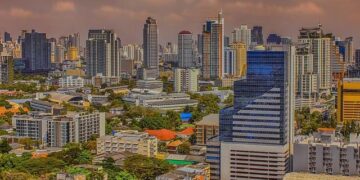In a troubling escalation of political repression in Myanmar, recent arrests of nonviolent protesters have reignited fears of systematic torture among detainees. As authorities clamp down on dissent amid ongoing civil unrest, rights advocates are sounding the alarm over the treatment of those merely exercising their freedom of speech. The latest crackdown comes as the military junta faces intensified international scrutiny for its violent suppression of opposition following the 2021 coup. With the specter of torture looming large over the detention facilities, civil society organizations are calling for immediate action to safeguard the rights and well-being of peaceful demonstrators caught in the crossfire of political turmoil. This article delves into the alarming reports surrounding these arrests and the broader implications for human rights in Myanmar.
Concerns Mount Over Treatment of Nonviolent Protesters Amid New Arrests in Myanmar
In recent days, the Myanmar military junta has intensified its crackdown on dissidents, with reports emerging of numerous new arrests targeting nonviolent political protesters. Activists report that many detainees are facing severe mistreatment, raising alarms among international observers and human rights organizations. Concerns are particularly focused on the potential for torture and inhumane treatment in detention facilities, where reports indicate that prisoners endure physical and psychological abuse designed to suppress dissent. The increasing violence against peaceful demonstrators underscores a troubling trend in which the regime appears to be systematically aiming to silence opposition voices, further entrenching its authoritarian grip on power.
The chilling climate for activists has prompted calls from various global organizations for immediate intervention and accountability from the junta. Key points of concern include:
- Reports of forced confessions.
- Denial of access to legal representation and medical care.
- The use of threats against family members of the arrested individuals.
Legal experts emphasize that the treatment of these protesters not only violates domestic laws but also international human rights standards. Amidst this backdrop, the future of democracy in Myanmar hangs precariously as the regime continues its campaign against those advocating for peaceful change.
Human Rights Advocates Call for International Action to Prevent Torture and Abuse
Following recent arrests in Myanmar, human rights advocates are amplifying their calls for immediate international intervention to safeguard nonviolent political protesters from the threat of torture and ill-treatment. Reports of increasing detentions have sparked fears that the military regime may intensify its brutal crackdown on dissent. Notably, observers have underscored the deteriorating conditions in detention centers, which are often marked by widespread abuse and a lack of oversight. The urgency for action is compounded by testimonies revealing the potential use of torture methodologies that have historically been employed against imprisoned activists. As the international community watches, the implications of inaction could lead to catastrophic consequences for those daring to voice their opposition.
In response to these alarming developments, several organizations are advocating for a comprehensive approach to pressure the Myanmar government. Key measures suggested include:
- Imposing targeted sanctions against military leaders and their business interests.
- Enhancing diplomatic efforts to engage neighboring countries to condemn the crackdown.
- Increasing humanitarian assistance for those affected by political violence.
- Requesting an independent investigation into allegations of torture.
Many believe that the time for merely observing the situation has passed, and a coordinated effort is essential to uphold human rights in Myanmar. The global community’s response will be pivotal in shaping the future of political activism in the region and in safeguarding fundamental freedoms.
Urgent Recommendations for Safeguarding Political Dissenters in Myanmar
As the situation in Myanmar intensifies, swift and decisive action is crucial to protect the rights and safety of political dissenters facing grave risks under authoritarian rule. International organizations and governments must take the lead by implementing targeted sanctions against those responsible for human rights violations, particularly military leaders and their affiliates. These measures should include:
- Asset freezes and travel bans on military officials implicated in torture and suppression of dissent.
- Support for independent investigations into human rights abuses, ensuring accountability for perpetrators.
- Increased humanitarian aid directed to organizations assisting political prisoners and their families.
- International monitoring to ensure safe passage and support for civil society organizations operating in Myanmar.
Moreover, collaboration among nations advocating for democracy and human rights is essential to amplify pressure on the military regime. Establishing a comprehensive system for reporting violations, alongside immediate legal assistance for detained activists, can foster a sense of security among dissenters. A coordinated effort might include:
| Action Item | Description |
|---|---|
| International Advocacy | Engage global human rights groups to raise awareness and mobilize support for Myanmar’s dissenters. |
| Network Creation | Establish secure communication channels for activists to share information and receive support. |
| Psychosocial Support | Implement programs addressing trauma and psychological wellbeing for those affected by violence. |
Insights and Conclusions
In conclusion, the recent arrests of nonviolent political protesters in Myanmar have reignited significant fears regarding the treatment of detainees in the country. As reports of potential torture and abuse emerge, human rights advocates emphasize the urgent need for international oversight and support for those fighting for democracy. The situation remains fluid, prompting calls for greater awareness and action to protect the rights of individuals exercising their freedom of expression. As Myanmar grapples with ongoing political turmoil, the implications of these arrests extend beyond borders, raising critical questions about the global community’s response to human rights violations in the region. Continued monitoring and advocacy will be essential in the months ahead, as activists and organizations work to ensure that voices for democracy are not silenced.














Did a Restorer Secretly Paint Italian Prime Minister Giorgia Meloni Into a Historic Church Fresco?